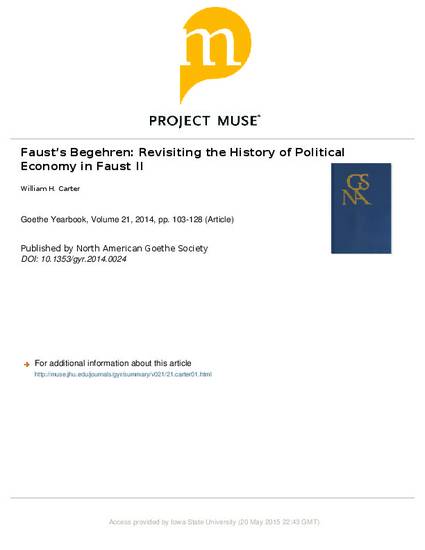
Since The Publication of Faust II, commentators interested in economic aspects of the text have focused primarily on three of its five acts. Bernd Mahl, whose work on Goethe’s economic knowledge remains a standard reference, writes that the topics most frequently addressed following its publication are the creation of paper money in act 1, Faust’s renewed activity in act 4, and the commercial ventures of Faust and Mephistopheles in act 5.1 More recent investigations have generally continued this trend.2 Given this lengthy history of interpretation, what is one to make of the second and third acts of Faust II with respect to economic matters? In the “Ökonomische Lesart” (Economic Reading) section of his Faust commentary, Ulrich Gaier offers this assessment: “Angesichts der Tatsache, daß sich der 2. und 3. Akt in Fausts Kopf abspielen, kann es hier nicht um reales Wirtschaften in der geschichtlichen Folge des Wirtschaftsgebarens der Neuzeit gehen”3 (Given the fact that acts 2 and 3 are acted out in Faust’s head, real economic activity resulting historically from economic behavior in the modern era cannot be at stake here). While Gaier accurately describes the tendency of literary and economic analyses of Faust II—including his own—to focus on the other three acts, his claim deserves closer scrutiny. It clearly hinges upon what he calls “reales Wirtschaften” (real economic activity); yet he does not define it or specify how it relates to the history of modern political economy. Admittedly, the second and third acts do not appear at first glance to contain the traditional economic elements found in the other acts. However, as I shall argue, to discount the two acts encompassing the Helena episode simply because they unfold in Faust’s head severely underestimates the complexity of Goethe’s political-economic thought in this significant portion of Faust II. Goethe does not simply set aside the keen insight into economic matters that he skillfully demonstrates throughout the rest of his self-described “Hauptgeschäft” (main business).4 Rather, he accentuates in acts 2 and 3 the subjective nature of value, particularly as it relates to the economic principle of demand. Goethe repeatedly employs and couples Wert (value) and Begehr/en (demand) in scenes leading up to and including the Helena episode. Moreover, he demonstrates in these two acts a significant change in his own approach to value, from an intrinsic to a subjective view of it.
Available at: http://works.bepress.com/william_carter/7/

This article is from Goethe Yearbook 21 (2014): 103, doi:10.1353/gyr.2014.0024. Posted with permission.